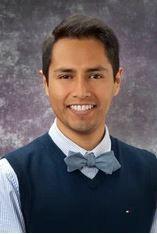
Neurology has fascinated Daniel Guillen, MD, since he took his first neuroscience class as a teenager. Now, as one of our neuromuscular medicine fellows, the pediatric neurologist is helping provide electromyography (EMG) exams, treating patients with amyotrophic lateral sclerosis (ALS), adults and children with muscular dystrophy, and learning from the complex, difficult decision-making of his peers and mentors. In this week’s “spotlight” interview, Guillen talks to us about what he’s learned as a fellow so far, his plans for a future in academic medicine, and hoping to reunite with his family after the end of the COVID-19 pandemic.
What are your current responsibilities as a neuromuscular fellow? What does a typical day look like for you?
We usually spend a good amount of time in the electromyography laboratory. We get brief histories and physical exams to determine the best nerves and muscles to study in each patient and work closely with our wonderful EMG technicians. We also work in the MDA clinic and go through 4 different rotations that include general neuromuscular clinics, EMG-guided chemodenervation, muscle biopsies and ALS clinic. A typical day would probably be a mixture of EMGs in the morning, usually starting from 8 to 8:30, with an average of 3 studies per fellow, noon conference in a neuromuscular topic, and then clinic in the afternoon.
How and when did you first get interested in neurology? What made you decide to focus on neuromuscular disease in particular?
I have been interested in neurology since I was 17 or 18 years old, whenever I did my first neuroscience class. I was just fascinated by the anatomy, the biology, and the complexity of every different situation. I do believe that I would have been happy working in any aspect of neurology, and ended up gravitating into neuromuscular medicine because of a wonderful mentor during residency.
I got involved in a project that allowed me to look into hundreds of charts of patients with neuromuscular disease. I honestly did not know much about any of those diseases before starting residency and I found every one of them very intriguing. I also like doing procedures and working on clinical trials. The new therapeutic approaches and new treatment options makes me think that there are endless opportunities for growth and to help people that, previously, had not many therapeutic options. The field is already different than it was 5 years ago.
What plans do you have for after you complete your fellowship? If you could have any job in the world what would it be?
I will follow a career in academics, trying to stay in neuromuscular medicine. My ideal job would include a lot of variety, clinically focused in neuromuscular medicine, with time for procedures, a significant amount of dedication to clinical trials, and be heavy in education.
What’s one aspect or experience of the neuromuscular fellowship that you’ve found particularly memorable or useful?
There are too many to pick just one, but I would have to say that what I cherish the most is the everyday exposure to the outstanding role models in the division; not only because of their incredible amounts of knowledge, but, because of their dedication and wisdom, which I will try to emulate in my career. I feel that, once I transition to attending life, I will make my most difficult decisions just asking myself what they would do in those situations.
What are you most looking forward to once the COVID-19 pandemic is over?
Meeting my whole family again. We have had covid-related losses in our families and have not been able to gather in person since the pandemic started.
What other passions or hobbies do you have outside of the Department?
Nowadays, mostly playing with my baby. In a more typical year, I enjoy swimming, running and going to the movies.
Guillen enjoys some outdoor time with his family.